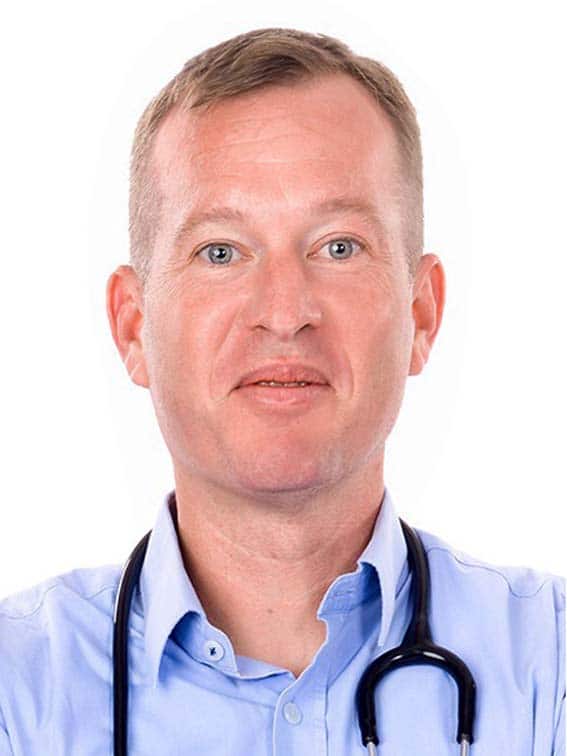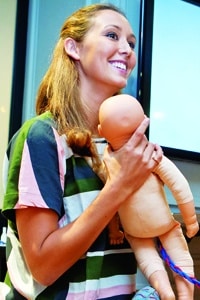We asked Dr Leo Hamilton, senior paediatrician at IMC Paediatric and Natasha Cullen, UK trained midwife and owner of Beloved Bumps all about having a baby in Singapore.
Q: Firstly what are the hospital options for giving birth?
Natasha C: There are 2 types of hospital options in Singapore that you can choose from – either a private hospital or a public hospital. If you have insurance, then a lot of expats tend to choose private hospitals (such as Thomson Medical, Mount Elizabeth, Gleneagles etc), however if you are having to pay the bills yourself then they tend to be cheaper at public hospitals such as NUH. Both types of hospitals have their pros and cons – private hospitals are more expensive, but have nicer rooms. Whereas public hospitals such as NUH have birthing pools that you can deliver in, and are more affordable, but still provide excellent care.
Dr Leo: The private hospitals are very good at providing high quality care for expat families, and always allow you to follow your birth plan. The public hospitals are also good, and usually cheaper, though the willingness to follow your birth plan may vary. Be aware that with the private hospitals you can elect to have an IMC doctor be there after the delivery. The public hospitals only allow their own doctors and training doctors to attend.
Q: Is it possible to have a home birth in Singapore?
Dr Leo: Yes, but most Obstetricians do not provide them (ask IMC if you want a doctor that does). There is also an option to deliver in a more private setting with Four Trimesters, which operates a safe and very well managed “Birth House”.
Few Pediatricians will go to a home birth (I am one of the few that does), but more are available who will see you at Four Trimesters. The availability should grow here as more and more doulas and midwives practice, but it is not a strong tradition in Singapore.
Natasha C: Yes it is – however only if you are signed up to an obstetrician who will do this, and there are very few who will (to my knowledge Dr Leo is one of the few). If you are going to have a homebirth, you will need to have a doula as well, who will be with you at home until the doctor arrives for delivery. Singapore is not as catered to homebirths as other countries as it is obstetric and not midwife led – there is the “Birth House” (mentioned by Dr Leo above) as an alternative option if you aren’t keen on delivering at home, but also not keen on hospital.
Q: My hospital has allocated me a paediatrician…but do I have a choice?
Natasha C: Yes you do! the joy of private healthcare is you have a choice in everything! You can meet with your paediatrician before the birth, and they will then attend the birth if necessary when the time comes. However, if you have a low risk pregnancy and aiming for a normal delivery, chances are that a paediatrician doesn’t need to be present for the birth, so you might just want to use the hospital paediatrician.
Dr Leo: Most obstetricians in Singapore tend to expect you will see the Paediatrician they suggest, even in low risk births. Most have relationships with local group practices and tend to always refer to them. It is never required, and you can have whomever you want to be there in the hospital. You may not be asked if you have a pediatrician you want, so sometimes you have to ask (or demand!). Even if you go with a suggested hospital Pediatrician, the Pediatrician or GP you want long term after leaving the hospital is always your choice.
Q: How many nights on average do new mothers stay in the hospital?
Dr Leo: Two nights is usual after a vaginal birth, three after a C-section. It varies, and I have plenty of mothers who would leave even without staying overnight. Part of the role of a Paediatrician is making sure all the testing and vaccinations are done to allow you to get out of the hospital when you’re ready.
Natasha C: It is totally dependent on you and your recovery, and also how feeding your baby is going. Most women tend to stay 1-2 nights in hospital after a vaginal delivery, and 2-3 nights after a caesaraean. If you do want to leave hospital a bit earlier, make sure you let the nursing staff know so that they can arrange babies checks and vaccinations on the morning of your discharge, otherwise this can delay you. There is no reason for you to have to stay for longer than 1 night after a vaginal delivery if you don’t want to – as long as you have passed urine, feel well, breastfeeding confidently, baby is well and checks are done, then you can head home! But some women like to stay longer as they have the staff around for reassurance and help.
Q: I’m scared of the pain of birth. Are epidurals common here?
Natasha C: Epidurals are common, especially in first time mummies – but being scared of the pain of birth will increase your likelihood of having an epidural! The first thing to do is really work on this fear – this can be done by attending a prenatal class, learning about hypnobirthing, desensitizing yourself by watching birthing documentaries, or even talking to a friend who has been through it already and had a great experience. If you are scared of pain, you will become more tense, release adrenaline, and then this can lead to a cascade of interventions, and make the pain seem worse. Think of when you are having a vaccination – if you tense your arm, the pain is worse, whereas if you relax, breathe, and stay calm and focused, you can really work on the pain being manageable and empowering.
However, that being said, if you have had a very long latent phase of labour, you haven’t slept, or you find the the contractions are just too much to handle, then an epidural is the best form of pain relief – it will take away your pain, and you can catch up on my much needed rest. Try to have an epidural only once you are in established labour, to give baby a chance to come down into the pelvis, your uterus to be contracting well, and to limit the time that you are sat on a bed.
Dr Leo: Epidurals are very common here, but whatever you need to make the birth experience best for you is supported.
Q: After birth, what are the checks needed for the baby in the first month?
Dr Leo: For a healthy child, we usually see you a week after delivery, mainly to make sure feeding is going well and to answer any questions about the stresses and worries of having a newborn at home. If things are well, we normally don’t need to see you again until your child is a month old. If any problems appear, like feeding issues or jaundice, we see you as often as needed.
Q: What happens if I struggle with breastfeeding…?
Natasha C: Don’t panic! I always ask mums, ‘what was the hardest thing about having a newborn’, and pretty much everyone says ‘breastfeeding’. The one thing to remember, is that if you are struggling, get help! Breastfeeding is something that you will never have done before if this is your first baby, and if its not your first – you have never breastfed THIS baby, and all babies are different!! There are so many avenues for help with breastfeeding here – lactation consultants, breastfeeding specialist, La Leche League groups. Make sure you access support. The one thing I will say about breastfeeding help, is that everyone has their own style and technique, so try to access help from one person, and if it is working then stick with them, otherwise it becomes very confusing and disheartening when you have 3 different people giving 3 different pieces of advice!
Dr Leo: Breastfeeding is not as natural as it seems, and most first time mothers can struggle for at least a week or two. It’s normal to struggle, and the guilt and stress that may accompany this only makes feeding worse. Lactation consultants are usually very helpful, and the nurses and doctors at IMC are always willing to talk as much as needed to help. And if you need a little bit of formula to get by in the first few weeks, it’s OK.
Q: What vaccinations will the baby need in the first year? And how often are the developmental checks?
Dr Leo: Vaccine schedules differ throughout the world, and part of what we do at IMC is talk with you about exactly what you want and need and the schedule that works best for you. Every country recommends at least two rounds of the pneumococcal (Prevnar) and diptheria-tetanus-pertussis-Hib-polio (Infanrix, or sometimes called just the “5 in 1”) vaccines. Most countries recommend the Hepatitis B vaccine starting in the hospital after delivery, but not everyone chooses to do this (and it’s usually not necessary). The BCG is also a common vaccine in Singapore, but not everyone needs it (it’s not legally required). Some countries recommend meningococcal vaccines in the first year, but most do not. It can be confusing. The vaccines and schedule you choose should always be part of discussions before and after delivery to make sure you get what you and your baby need.
Developmental checks usually follow the vaccine schedule you choose, monthly or every other month. At nine months the visits typically space out to be every three months. Of course, if your child has any health, growth, or developmental concerns, the visits are more frequent.
Last thoughts?
Natasha C: Having a baby can be really tough – so please remember you are not the only one who is struggling, and it doesn’t mean you are a terrible mother or a failure if you need help. ‘It takes a village’ could not be more true when it comes to raising children, so make sure you access help when you need it, and try to get out and about a few times a week. There are loads of baby and toddler groups in Singapore to attend where you can meet other mums, share your concerns and worries, and just feel ‘normal’ again! Beloved Bumps runs a coffee morning every Tuesday which you can attend to meet other mums and get help from a midwife, or if you are pregnant you can attend their prenatal classes to meet other couples who are having a baby around the same time as you. Visit their website for more details.
Dr Leo: You realize after delivery that everyone has expert advice on how best to raise a baby. This can be helpful or confusing or just worrying. It’s often stressful even with a perfect baby with lack of sleep, sometimes constant feeding, and the problems of expat life in Singapore. The best help we can give is to listen and make sure we are responding to your needs, and the best Pediatrician for you is the one who makes your life less stressful.

Call 6887 4440 or visit www.imc-healthcare.com
Natasha Cullen is a UK trained midwife and founder Beloved Bumps
Call T: 8809 8623 or visit www.belovedbumps.com.sg


































